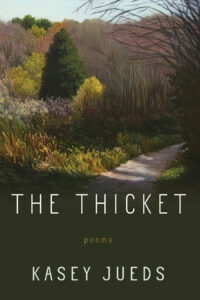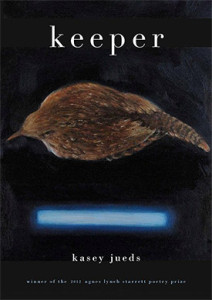the thicket
My second book, The Thicket, was published as part of the Pitt Poetry Series in November, 2021. If you like, you can order it from Pitt, or from the good folks at Bookshop, or from your local independent bookstore.
I’m very grateful to Michael Metivier, Marissa Ahmadkhani, Jane Zwart, Aarik Danielsen, Katharine Whitcomb, Katherine Indermaur, and Randall Potts for reviewing The Thicket with such attention, generosity, and care. In EcoTheo, Metivier writes, “The longing in Jueds’s work, to me, emerges from not being able to encompass, witness, or comprehend everything at once—because of time, dislocation, or both. How can we hold onto the world’s incredible beauty at the same time as we understand it is fleeting?” Read the full review here.
In The West Review, Akmadkhani writes, “Jueds’s newest book asks readers to look closely at what surrounds them and to re-evaluate what is beautiful and what is broken. The Thicket does not shy away from loss or sadness; instead, Jueds addresses difficult subjects and yet maintains a sense of tenderness and admiration for the world.” Read the full review here.
In Plume, Zwart writes, “What expands inside Jueds’s new book is an irreducible reality—a sense that makes memory flicker, a knowing that underscores the distance between a word and what it calls or recalls.” Read the full review here.
In Tinderbox, Danielsen writes, “Even losing yourself momentarily in one of Jueds’ lines—and how could you not?—becomes a means of reconnecting to something inborn and reaching the wilds of real, messy, glorious living. In this way, The Thicket is a field guide worth picking up again and again.” Read the full review here.
In River Mouth Review, Whitcomb writes, “Jueds’ writing throughout is sensual and evocative. Her poetic landscape can seem ruined or barely inhabited, haunted, or full of wind, water, trees, fields, houses from childhood, sheds, and attic rooms. Nature is a controlling metaphor, enmeshed with enchantment, allegory, and fairy tales. The Thicket brings the reader into secret spaces; the speaker is not foregrounded, but acts as a seeker, a scout, an interpreter, a memory-keeper.” Read the full review here.
In Sugar House Review, Indermaur writes, “I caught myself returning to the spells cast by these lyrical poems over and over, wanting to steep in this book’s verdant magic as much as fresh air.” Read the full review here.
And in Colorado Review, Potts writes, “Kasey Jueds’s second collection, The Thicket, has intersecting emotional and imagistic arcs that reward the careful reader with complex realizations that refuse closure. Two questions are skeleton keys that allow the speaker—and the reader—to unlock metaphorical gates of self-awareness: ‘where am I?’ and ‘where does one thing become another?’… In The Thicket, these questions reveal liminal spaces between people, places, and sexuality.” Read the full review here.
keeper
“This debut collection is nearly perfect—measured, never pretending to ask more than it can deliver, and yet producing poem after proportional poem with a satisfying precision… Jueds tackles everything with a strong, sure intelligence, unravelling the ‘reverse sides’ in order to see how the world works… This outstanding collection is the result of… careful, microscopic looking, and from the attention this poet has paid to her sinuous craft. Kasey Jueds is a keeper.” —Judith Kitchen, The Georgia Review
My first book, Keeper, won the 2012 Agnes Lynch Starrett Prize from the University of Pittsburgh Press.
Keeper is a book of lyric poems concerned with relationships of different sorts—with the natural world, with people and animals, and with the unseen and unknown.
reviews & praise for Keeper

To buy: from your local independent bookstore, or the University of Pittsburgh Press, or Powells, or in paperback & Kindle on Amazon.
- Ann Fisher-Wirth’s super-generous review of Keeper is here in the Valparaiso Poetry Review.
- Here is Judith Kitchen’s review of Keeper and four other books in the Georgia Review. It’s incredibly perceptive, thoughtful, and large-hearted. Thank you, Judith.
- This is a lovely review of Keeper on the Review a Week blog.
“This perceptive, sensual history of a soul grows more bold and mysterious as it unfolds: to show a life pondering what to keep, what to lose, what to leave, and what to find: and discovering that, as an old gravestone says, what we had, we have.”
—Jean Valentine
“Kasey Jueds’s poems make my arterial blood rush! She is so uniquely attuned to the world, such a close noticer of both the human and the natural world (and both as one) that I often feel her poems are not so much about something as they are the actual things, the actual embodiments of their subjects. Isn’t that what good poems are supposed to do? I say, yes!”
—Thomas Lux
“From the very first poem, ‘The Bat,’ we know we are in the presence of a vibrant new voice, confident and true. Jueds has a sensitive ear and a sharp eye. These poems of memory, of the natural world, and of art go from the specific to the abstract with amazing ease. ‘How perfect the things we are not meant to see,’ she tells us, even as she is showing us these very things.”
—Linda Pastan
“[Jueds’s] poems are deceptively accessible. She writes about animals, places, weather, personal experience, firmly grounded in the actual. Yet one gradually becomes aware of an undertow, a spirituality that does not call attention to itself at first, but that gathers power upon rereading… Keeper explores the more mysterious and melancholy reaches of the self in its dance with vanishing.”
—Ann Fisher-Wirth, Valparaiso Poetry Review
“One recent book that should be on many bookshelves is Kasey Jueds’s Keeper. This book is packed full of gorgeous imagery and palpable metaphors. Her voice resonates as both mature woman and innocent child… worthy of multiple reads.”
—Ashlie McDiarmid, examiner.com
“[Jueds’s] metaphors are sensuous and original as they blend fact with imagery, the actual with the abstract… Each particular experience grows into another and eventually into something bigger, something universal… The pleasure that comes from reading Jueds’s poems is that we can slip inside them, be held in their stories, and transformed by their explorations and discoveries.”
—Michelle Gillett, Crab Creek Review
“… One of the strengths of Keeper is its remarkable unity; if there is one word to describe Jueds’s collection, it is longing, and the book’s shape is its natural expression… The collection never wears thin, because Jueds’s ear is so fine, her voice so well-modulated.”
—Kathleen Flenniken, The Manhattan Review
“These are poems of quiet revelation. They show me a mind thinking, in images and through metaphor, turning an idea over and then over again. Reading Jueds’s work feels like walking around a large scuplture, noticing how it seems to move of its own accord, responding to our angle of vision.”
—Lynn Domina, A Review a Week